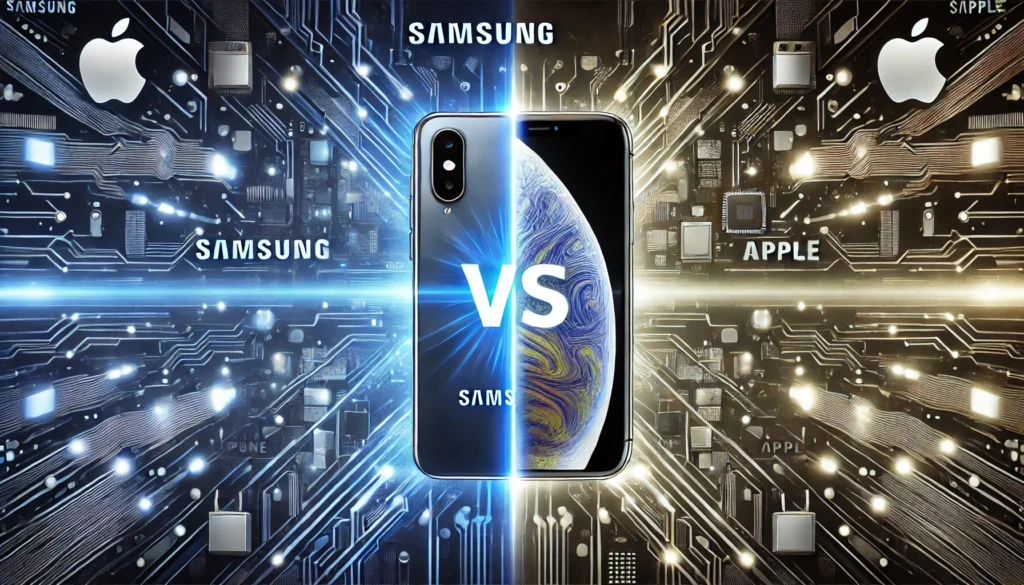
When it comes to smartphones, undoubtedly, two brands dominate the industry—Samsung and Apple. Not only do both companies have a massive following, but they also consistently push the boundaries of innovation with their flagship models. However, choosing between them can be challenging since each offers unique advantages. Therefore, this comparison will highlight key differences to guide your decision. For a more comprehensive look at smartphone trends, check out our 2024 Smartphone Market Report.
1. Operating System: iOS vs. Android
First and foremost, the operating system creates the biggest divide. To clarify, Apple’s iOS is a closed ecosystem, whereas Samsung uses Android with its One UI skin.
- Apple (iOS): Particularly known for its security and simplicity, iOS offers seamless integration with other Apple devices. Moreover, Apple provides 5+ years of updates, as detailed in our iPhone Longevity Guide.
- Samsung (One UI): In contrast, offers deeper customization, as explored in our Android Customization Tips. That said, updates arrive slower than on Pixel devices.
Winner: Choose Apple for simplicity, whereas Samsung excels in flexibility.
2. Design and Build Quality
When examining hardware, their philosophies differ dramatically:
- Apple: Uses surgical-grade stainless steel and industry-leading Ceramic Shield glass. For more on materials, see our Smartphone Durability Test.
- Samsung: Meanwhile, pioneers foldable designs like the Z Fold 5, which we reviewed in Foldable Phones: Worth It?.
Winner: Apple wins for premium feel, but Samsung leads in innovation.
3. Display Technology
Regarding screens, both excel but differently:
- Apple’s ProMotion displays adapt up to 120Hz. Learn why refresh rates matter in our Display Technology Explained guide.
- Samsung’s Dynamic AMOLED 2X screens not only hit 1750 nits brightness but also offer superior color accuracy.
Winner: Samsung by a hair, especially for media consumption.
4. Performance and Processors
Turning to raw power:
- Apple’s A17 Pro chip dominates benchmarks, as shown in our Processor Comparison Tool.
- Samsung’s Snapdragon 8 Gen 2 while powerful, can’t match Apple’s efficiency.
Winner: Apple for sheer performance and longevity.
5. Camera Quality
When comparing cameras:
- Apple excels in video with Cinematic mode, featured in our Smartphone Videography Guide.
- Samsung’s 200MP sensor and 100x zoom outperform in daylight, as seen in our Camera Shootout.
Winner: Tie – Apple for video, Samsung for photos.
6. Battery Life and Charging
Concerning endurance:
- Apple optimizes well but limits fast charging to 27W.
- Samsung offers 45W charging plus Wireless PowerShare, covered in our Fast Charging Explained article.
Winner: Samsung for practical daily use.
7. Software Updates
- Apple’s 6-year support far exceeds Android’s 4-year promise.
- Samsung has improved, yet still trails as analyzed in our Update Policy Breakdown.
Winner: Apple without question.
8. Ecosystem
- Apple’s continuity features like Handoff create what many call a “walled garden.”
- Samsung plays nicer with Windows, especially with Link to Windows.
Winner: Depends on your other devices.
9. Pricing
Finally, cost differences:
- Apple starts at 799(iPhone15)∗∗goingupto∗∗799(iPhone15)∗∗goingupto∗∗1,599 (Pro Max).
- Samsung ranges from 299(A−series)to299(A−series)to1,799 (Fold). Compare all options in our Price Comparison Tool.
Final Recommendation
In summary:
- Best Overall: iPhone 15 Pro (see why in our Review)
- Most Innovative: Galaxy S23 Ultra (full analysis here)
- Budget Pick: Galaxy A54 (featured in our Best Budget Phones)
For ongoing comparisons, bookmark our Smartphone Hub.
1. Operating System: iOS vs. Android
First and foremost, the most significant difference lies in their operating systems. To clarify, Apple exclusively uses iOS, whereas Samsung smartphones run on Android with Samsung’s custom One UI skin.
- Apple (iOS): iOS is widely praised for its simplicity, security, and seamless integration across Apple devices. Moreover, it delivers a consistently smooth experience along with regular software updates for many years. For instance, even older iPhone models receive updates long after their release. To dive deeper, consider reading our comparison: iOS vs. Android: Which Is Right for You?.
- Samsung (Android with One UI): On the contrary, Samsung’s Android-based interface prioritizes customization, offering greater flexibility, extensive widget support, and broader third-party app options. That being said, Android updates often face delays due to Samsung’s additional UI layer.
Winner: Ultimately, if you prefer a user-friendly, secure, and seamless experience, Apple stands out. Conversely, if customization and flexibility matter more to you, Samsung emerges as the superior choice.
2. Design and Build Quality
When examining design philosophies, Apple and Samsung take notably different approaches.
- Apple: Typically, Apple embraces minimalism with premium aluminum or stainless steel builds. Furthermore, iPhones maintain a uniform aesthetic across generations, resulting in a timeless appeal.
- Samsung: In contrast, Samsung experiments with diverse designs, ranging from sleek glass-back phones to revolutionary foldable devices like the Galaxy Z Fold and Flip series. Additionally, Samsung’s curved-edge displays contribute to a more futuristic look.
Winner: In summary, if you favor sleek, consistent design, Apple prevails. However, if innovative and varied designs excite you, Samsung takes the lead.
3. Display Technology
Regarding display quality, both brands excel, yet Samsung holds a slight edge.
- Apple: Specifically, Apple uses Super Retina XDR OLED displays known for excellent color accuracy and brightness.
- Samsung: Meanwhile, Samsung’s Dynamic AMOLED 2X displays boast richer colors, deeper blacks, and smoother refresh rates (up to 120Hz). For a deeper understanding, explore Samsung’s Display Technology.
Winner: Clearly, Samsung leads in display innovation, thanks to its superior AMOLED technology.
4. Performance and Processors
Turning to performance, their processor differences significantly impact user experience.
- Apple: Notably, Apple’s A-series Bionic chips are optimized for unmatched efficiency and speed. As a result, iPhones often outperform Android devices in benchmarks and longevity.
- Samsung: Alternatively, Samsung relies on Exynos or Snapdragon processors, which, while powerful, can’t always rival Apple’s optimization.
For concrete data, refer to Geekbench’s CPU Benchmark Reports.
Winner: Unquestionably, Apple dominates in raw performance and software synergy.
5. Camera Quality
When comparing cameras, both brands shine in distinct ways.
- Apple: iPhones produce natural-looking photos with realistic tones, coupled with intuitive features like Cinematic Mode.
- Samsung: In comparison, Samsung emphasizes high-resolution sensors, AI enhancements, and groundbreaking zoom capabilities (up to 100x).
For side-by-side samples, visit our Best Smartphone Cameras of 2025 guide.
Winner: In essence, Apple excels in consistency and ease of use, while Samsung wins for versatility and innovation.
6. Battery Life and Charging Speed
Concerning battery performance, differences are stark.
- Apple: Although iPhones optimize battery life well, their charging speeds lag (max 20W wired).
- Samsung: Meanwhile, Galaxy phones pack larger batteries with dramatically faster charging (up to 45W) and Wireless PowerShare.
Winner: Thus, Samsung is the clear choice for power users.
7. Software Updates and Longevity
- Apple: Remarkably, provides 5-6 years of iOS updates, ensuring long-term security.
- Samsung: While improved, offers only 4 years of major updates.
For context, see Google’s Android Update Policy.
Winner: Consequently, Apple’s extended support is unbeatable.
8. Ecosystem and Compatibility
- Apple: Thanks to AirDrop, Handoff, and iMessage, its ecosystem is unparalleled.
- Samsung: Although compatible with Windows/Android, lacks Apple’s seamless integration.
Winner: Hence, Apple wins for ecosystem cohesion.
9. Pricing and Value for Money
- Apple: Unsurprisingly, commands premium prices (from $799).
- Samsung: Conversely, offers budget to flagship options.
Winner: Accordingly, Samsung provides better flexibility.
Final Verdict
In closing, your ideal choice hinges on priorities:
- Apple for simplicity, longevity, and ecosystem.
- Samsung for innovation, customization, and value.
For further insights, consult CNET’s Smartphone Reviews.
